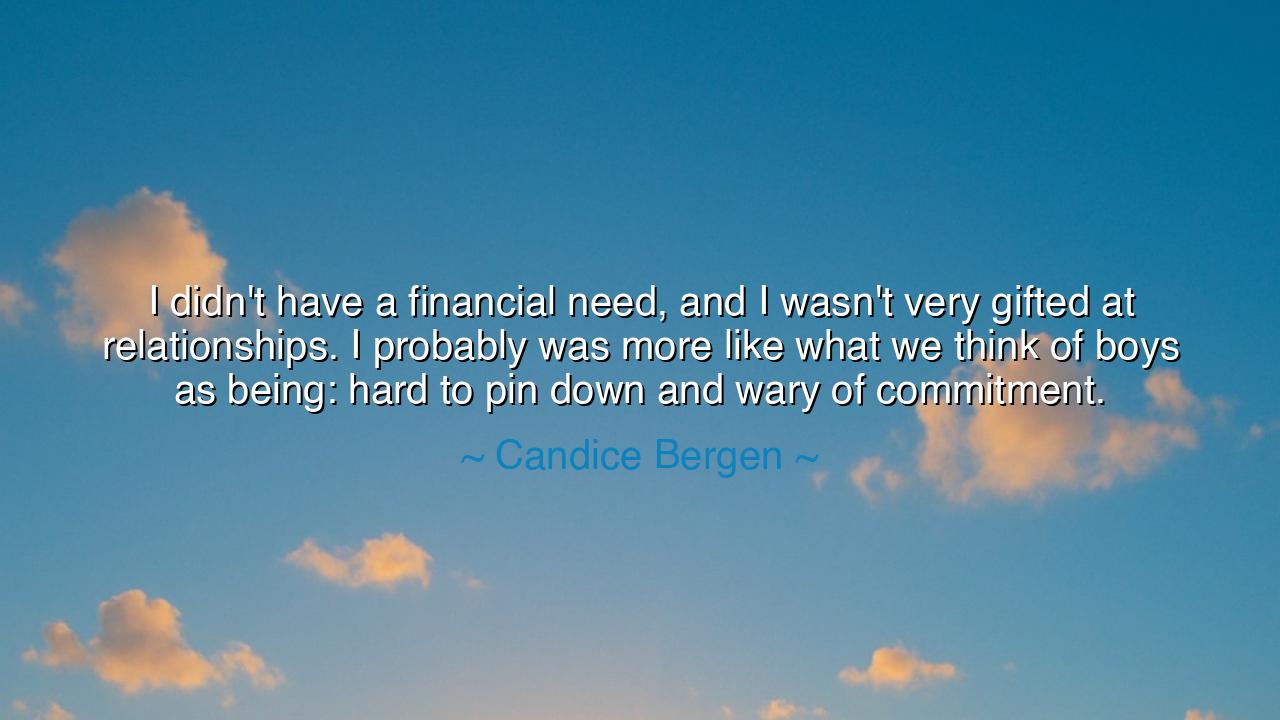
I didn't have a financial need, and I wasn't very gifted at
I didn't have a financial need, and I wasn't very gifted at relationships. I probably was more like what we think of boys as being: hard to pin down and wary of commitment.






When Candice Bergen spoke the words, “I didn’t have a financial need, and I wasn’t very gifted at relationships. I probably was more like what we think of boys as being: hard to pin down and wary of commitment,” she uttered a truth that ripples across generations — the cry of a soul that sought freedom over expectation, self-sufficiency over dependence, and truth over conformity. Beneath her quiet reflection lies the fire of transformation: the awakening of a woman who refused to be defined by the narrow scripts of her age. Her words are not an apology, but a declaration — that identity is not given, it is forged.
In a world that often demanded women to need, to attach, to belong, Bergen stood apart. She admits with candor that she was “not gifted at relationships,” yet what she reveals is not a flaw, but an honesty — the courage to say, I did not fit the mold, and I chose not to pretend I did. Her life did not orbit around financial dependence or romantic validation; instead, she pursued a rarer path: the journey of self-discovery unanchored by others. Like the heroes of old who walked alone into the wilderness to test their spirit, she too embraced solitude as both challenge and strength.
Her admission, “I was more like what we think of boys as being: hard to pin down and wary of commitment,” turns the mirror toward society itself. What she names is not masculinity, but liberty — the right to live on one’s own terms. For centuries, men were praised for being unattached, ambitious, and independent; women, by contrast, were taught to define themselves through connection. Bergen, in this moment of clarity, unbinds that old order. She reclaims for women what men had long possessed — the right to be alone without apology, to chase purpose without guilt, to say no to what does not nourish the soul.
History too holds the echoes of such spirits. Consider Artemisia of Caria, the warrior queen of ancient Greece, who refused marriage and ruled her city with wisdom and might. She was not “hard to pin down” — she was impossible to contain. Her loyalty was not to any man, but to her own vision. Like Bergen, she defied the expectations of her gender, not out of rebellion, but from an inner knowledge that the self must first be whole before it can truly join with another. Both women embody the truth that commitment without identity is captivity, and that to choose solitude is not to reject love, but to seek it in its purest, most honest form.
Bergen’s financial independence is also no small note. It freed her from the ancient chains that bound so many before her — those who loved not because they desired, but because they must. In her words, “I didn’t have a financial need,” we hear the dawn of a new age: the moment when a woman’s survival was no longer tied to her submission. Freed from the necessity of dependence, she could afford to explore the deeper terrain of who she was and what she wanted. True freedom, she reminds us, begins not with wealth, but with the ability to choose without fear.
Yet, her reflection is not arrogance; it carries the ache of wisdom. To be “wary of commitment” is to admit both strength and sorrow — for independence, while noble, can be lonely. The path of the self-reliant soul is a narrow one, lined with both freedom and distance. Many who walk it find peace, but others find longing. Bergen’s tone carries both — the pride of one who chose her own path, and the humility of one who knows what was left behind. This is the eternal trade of freedom: that in gaining the world, we sometimes lose the warmth of closeness.
And so, her words become a lesson to all seekers: know thyself before you bind thyself. Do not rush toward relationships to escape solitude, nor flee from them out of fear. The strength of Bergen’s truth lies in balance — to love oneself enough to stand alone, yet remain open enough to share life when it feels right. Independence is not rejection; it is preparation. The soul that knows its worth does not cling, but chooses. The heart that is whole does not fear commitment — it simply refuses to be consumed by it.
Therefore, O listener, take this teaching as your own: freedom and love are not enemies, but companions, when both are rooted in self-awareness. Cultivate your independence, as Bergen did, for it will guard you against false attachments. But also, keep your heart soft, so that when true companionship arrives, you may meet it not from need, but from abundance. For the one who knows their own strength need never fear losing it — even when they finally choose to share it.






AAdministratorAdministrator
Welcome, honored guests. Please leave a comment, we will respond soon